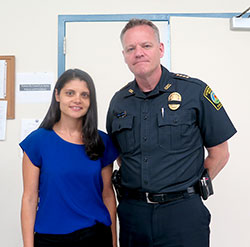
Manager of Diversity, Equity, and Inclusion Nency Salamoun (left) introduced Chief of Police David Fallon (right) at the Immigrant/Police Dialogue Series. —Photo by
By Shira Laucharoen
By Shira Laucharoen
The Human Rights Commission held a session of the Immigrant/Police Dialogue Series addressing pressing social concerns at the Cross Street Center on July 19. With the aim of increasing transparency and examining this complicated relationship, the Chief of Police, David Fallon responded to questions from attendees.
Fallon revealed that the report of domestic violence related incidents has experienced some dips over the years, rising and falling since 2015. Of these incidents, the Somerville Police Department does not know the ethnicity of those involved, as Fallon said that the police do not report race in their statistics.
One individual raised the question of whether victims of crime who do not have a social security number and only have a foreign passport would have their information shared with other parties. Fallon said that information would be passed on to Homeland Security Investigations, a division of ICE, if requested, although he stated that there have not yet been reported incidents of Somerville residents being picked up by ICE.
Maureen DiPaolo, a victim witness advocate with the Family Services Unit, explained that the police do not have official translators for victims who may not speak English, but that there are often officers who speak different languages at hand or third parties accompanying the victims. The Police Department also offers a language access line for callers. DiPaolo described her role in helping victims find resources, stating that victims are often dependent on abusers for food sources and housing, a condition that may complicate each case.
Attendees of the meeting reflected on the past and current relationship between immigrant residents and the police. Regina Bertholdo, of Somerville Public Schools, stated that she had “witnessed horrible behavior of the police in the past towards immigrants,” but that the situation has improved greatly. One individual drew attention to the gang ordinance passed in May 2004, a law that was viewed as promoting racial profiling and creating a strained dynamic between the police and the community. In addition, Fallon updated meeting participants on new initiatives the Police Department is establishing, including a cadet program which will recruit from high school minority and female students, as well as a basketball program.
The Immigrant/Police Dialogue Series, which are public meetings that have been run for the past 10 years, will be held quarterly, and the next session will be hosted on October 18 at the Central Library. The city’s manager of Diversity, Equity, and Inclusion Nency Salamoun said that it is the program’s goal to have increased immigrant representation at the meetings.
“We want members of the community to feel safe in this space and ask questions without fear,” Salamoun said.















Reader Comments